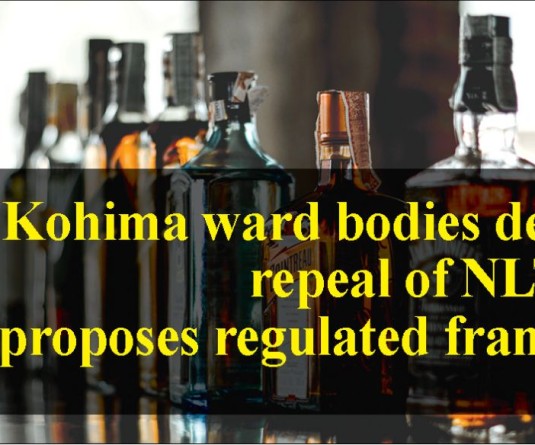Dignitaries during the unveiling of the Platinum Jubilee monolith in Duncan Bosti on January 11.

Morung Express News
Dimapur | January 11
One of Dimapur’s most prominent localities— Duncan Bosti, has turned 75. The colony’s name is tied to a British colonial administrator, SJ Duncan, who served as the Deputy Commissioner of the erstwhile Naga Hills district in the late 1940s and early 1950s.
The celebration marking the platinum jubilee was organised on January 11, which also had in attendance a descendant of SJ Duncan, Dr Richard Duncan Lyngdoh. Deputy Chief Minister, Y Patton, was the special guest, while MLA and Advisor, Information and Public Relations, Soil and Water Conservation, Imkong L Imchen was a guest of honour.
Patton in his address honoured the founders of a locality, which, in his words, is revered by the citizenry of Dimapur. As opposed to a perceived divided Naga society, the Deputy CM termed Duncan Bosti as an exemplar of unity. In the seven and a half decades since it was founded, he said that the locality has transformed into a community where the residents share a strong bond, earning the respect of other localities. “This is what makes Duncan Bosti revered by all,” he said, while giving his respects to the elders and pioneers who laid the foundation of the colony.
Dr Richard Duncan Lyngdoh, grandson of SJ Duncan, said that his grandfather was posted to Kohima in 1949 as the DC of the Naga Hills, then a district of Assam. He described Duncan as “a man of the people,” who went on to become a member of the first Meghalaya Legislative Assembly in 1972.
Besides, he had a passion for writing, publishing several works, which included prose, poetry and drama, in the Khasi language.
“He had a great love for the Naga people and had a special corner in his house, where he had put up a beautiful picture of the Kohima War Cemetery, surrounded by items of Khasi decoration like spears and shawls. It showed the love that he and his wife, my grandmother, had for the Naga people,” he said.
According to him, the locality named after his grandfather, has thrived in so many ways. He expressed confidence that Duncan Bosti will continue to and be an enduring feature of Dimapur city, and “be able to give to the life of Dimapur and the state of Nagaland as well.”
As told to The Morung Express by Lyngdoh, SJ Duncan was the son of a British Indian Civil Service officer, William Alexander Duncan. Duncan senior passed away in a tragic horse riding accident in Dibrugarh in 1897, when his son was only 3-4 months old.
Lyngdoh said that he would not have existed if his grandmother, who was half Khasi, had not resisted relocating to Scotland after her husband’s demise. “His mother was half Khasi. His father was of Scottish descent. So that way he was three quarters British, one quarter Khasi,” he said, while adding that it was through this relation that his grandfather attained Khasi identity.
SJ Duncan had two sons, one of whom was Richard Duncan Lyngdoh’s father.
SJ Duncan was brought up in Shillong, going on to graduate from Scottish Church College, Kolkata, after which he joined the Assam Civil Service in 1922. He was posted in several places, including Chandel, Tamenglong, Ukhrul and Imphal as SDO.
After Independence, he was posted to Kohima, where he remained until his retirement. It was during this time that a place called Duncan Bosti was established by a group of Nagas in Dimapur.
Lyngdoh gave additional trivia. SJ Duncan has great grandchildren living in Nagaland today. Lyngdoh’s sister is married to a Naga, Dr Visier Sanyü, the academic and historian, who is also a member of the Forum for Naga Reconciliation, Advisor to the Naga Global Forum, and President of the Peace Initiative in North-East India (PINE).




